Referring your patient for clinical care
by an Interventional Radiologist
Interventional Radiologists are effective in diagnosing and caring for patients with a range of treatments. Understanding when to refer to and collaborate with an Interventional Radiologist, can provide new options for you to explore with your patients.
An Interventional Radiologist can provide invaluable assistance in both diagnosis and administering state-of-the-art management and treatment options for patients.
Unsure how an Interventional Radiologist can help your patients? Read further to learn more about the key conditions an interventional radiologist can treat.
Who Are Interventional Radiologists?
Interventional Radiology is a distinct subspecialty of clinical radiology that combines an in-depth understanding of clinical radiology with advanced procedural skills and clinical management.
An Interventional Radiologist (IR) works as the primary specialist caring for patients who undergo interventional procedures or as part of a multidisciplinary patient care team. The IR has direct involvement in the full cycle of clinical care. Using advanced imaging techniques like X-ray, CT, MRI, and ultrasound, interventional radiologists can accurately administer targeted treatments for patients reducing hospital stays, minimising complications, and saving lives.
Collaborating with colleagues from various specialties, they gain a comprehensive understanding of a patient’s unique needs, exchanging ideas to devise targeted solutions for optimal patient care.
We Provide
Clinical Care
Patients often present unique challenges, including inadequate responses to treatment or a desire to explore alternative options. Embracing a multidisciplinary approach to medical intervention, Interventional Radiologists can work closely with you to offer treatments for your patients’ particular condition.
What Conditions Can Interventional
Radiology Help Treat?
Interventional radiologists can effectively treat a wide range of conditions, including:
Vascular Disease
Addressing pain and disability associated with peripheral arterial disease (PAD) using balloon angioplasty and/or stenting. They also manage varicose veins and other vascular diseases, including acute and chronic deep vein thrombosis and pulmonary embolism.
Cancer
Delivering targeted treatments such as chemoembolisation, selective internal radiation, cryoablation, radiofrequency ablation, and microwave ablation.
Women’s Health Conditions
Treating conditions like uterine fibroids, certain types of pelvic pain, and certain infertility issues. Embolisation effectively blocks blood flow to address fibroids, adenomyosis, uterine arteriovenous malformations, and postpartum haemorrhage.
Men’s Health Conditions
Offering relief for enlarged prostates using prostate artery embolisation and address varicoceles (enlarged veins in the scrotum) through minimally invasive embolisation.
In addition to these conditions, interventional radiologists treat various other diseases and conditions, such as
biliary diseases, hypertension, kidney disease, vertebral compression fractures, trauma, and bleeding.
Do You Have a Question?
Checkout our Frequently Asked Questions Section. If you still have more questions about Interventional Radiology and how they can help, find the Interventional Radiologist near you using our Doctor Finder, and they’ll be available to answer all of your questions.
When Should I Consult with an IR?
Doctors are encouraged to seek the expertise and advice of an interventional radiologist when they have a patient that presents with any of the key conditions listed above.
What's the Best Way to Find an IR?
To find an interventional radiologist near you, you can use the Doctor Finder feature on this IRSA website. You’ll be able to search for someone geographically, but you can also filter their disciplines for specifically targeting an Interventional Radiologist in your area that addresses the concerns of your patient specifically.
Procedures Performed by IR
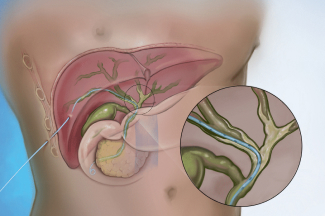
BILIARY DRAINAGE AND STENTING
Biliary drainage is the insertion of a tube into the bile duct. This is mainly carried out when the bile ducts are blocked.

Carotid
Stenting
Carotid stenting encompasses a spectrum of advanced medical procedures designed to address conditions affecting the blood vessels that are supplying the brain or neck region.

Cryoablation for Kidney Tumours
Cryoablation offers a minimally invasive treatment option that effectively destroys cancerous cells while preserving healthy tissue. It is performed by interventional radiologists, who use advanced imaging technology to guide the procedure.

Embolisation for Mesenteric Artery Aneurysms
A mesenteric artery aneurysm is a condition where a section of the artery that supplies blood to your intestines weakens and bulges. These aneurysms in the aortic wall are relatively rare but can pose significant health risks if left untreated.
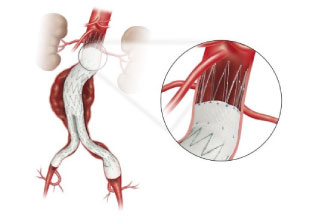
Endovascular Aneurysm Repair
Endovascular Aneurysm Repair (EVAR) is an advancement in the field of vascular surgery, offering a minimally invasive solution to manage aortic aneurysms.

GENICULAR ARTERY EMBOLISATION
A modern knee pain treatment solution for individuals dealing with persistent and stubborn knee pain due to arthritis.
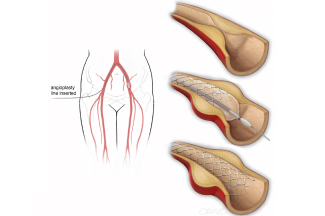
LOWER LIMB ANGIOPLASTY
Angioplasty is a procedure to open narrowed or blocked blood arteries that supply blood to your legs. A stent is a small, metal mesh tube that keeps the artery permanently open.
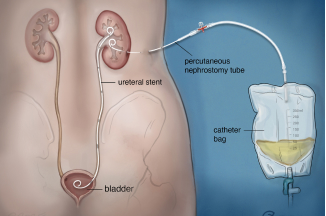
NEPHROSTOMY
A nephrostomy is a procedure to drain urine from your kidney using a catheter (tube).
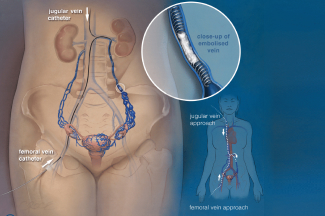
OVARIAN VEIN
EmBOLISATION
Ovarian vein embolisation is a minimally invasive treatment that is used to close off faulty veins so they can no longer enlarge with blood, thus relieving the pain caused by congestion.

PROSTATE ARTERY EMBOLiSATION
Prostate artery embolisation is a minimally invasive procedure performed by interventional radiologists to treat an enlarged prostate.

Paediatric Interventions
Minimally invasive procedures for a variety of conditions that impact children.

PERCUTANEOUS
Percutaneous means “through the skin”. A biopsy is a method of using a special needle to take a small piece of tissue from inside the body for analysis in the laboratory, normally to diagnose or exclude cancer.

PICC
A PICC is a long soft flexible tube (catheter) that is usually inserted into one of the veins in the upper arm. The tube is then advanced into a large vein next to the right side of the heart.

PORT PLACEMENT
A port is a small medical implant that is inserted beneath your skin. It consists of a reservoir compartment (the port) with a silicone diaphragm that provides a watertight seal around the area where a needle is inserted.

Renal Artery Stenosis
Renal artery stenosis is a narrowing of the vessel(s) supplying blood to your kidneys,. If you’ve been diagnosed with renal artery stenosis, minimally invasive procedures like renal artery angioplasty and stenting by an interventional radiologist can be a minimally invasive solution.

SIRT
SIRT is a minimally invasive treatment for tumours arising in the liver or that have spread to the liver, from other places in the body, such as the bowel or breast.

TACE
Transarterial Chemoembolisation is a form of chemotherapy delivered through the arteries that allows treatment to be targeted to liver tumours and minimises the amount of chemotherapy the rest of the body is subject to.

TIPS
TIPS is a procedure that lowers pressure in the portal vein. That’s the vein that moves blood to your liver.

Tumour
Ablation
Tumour ablation is the process whereby a needle is placed directly into a tumour and a treatment is delivered aiming to kill the tumour in place.

Varicose
Veins
Varicose veins occur when the valves in the veins malfunction, causing blood to pool and veins to enlarge. Interventional Radiology’s minimally invasive procedures can reduce varicose vein’s impact on the body.

Varicocele Embolisation
Varicocele embolisation is an image-guided procedure that uses a catheter (thin, plastic tube) to place tiny coils and/or a liquid substance into a malfunctioning vein in your scrotum to divert blood flow away from a varicocele.

Vertebroplasty
Vertebroplasty is a minimally invasive procedure, performed by an interventional radiologist, that can reduce severe spinal pain caused by new osteoporotic vertebral fractures.

UAE
Uterine Fibroids are benign (non-cancerous) growths in the uterus which may lead to various symptoms including heavy and painful periods, going to the toilet frequently, pelvic pressure.
Resource Centre
Discover More About How IR
CAN HELP YOUR PATIENTS
Learn more about the treatments performed by Interventional Radiologists by downloading our Brochures.
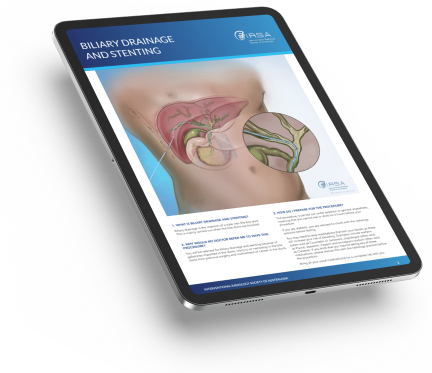

Find an IR Near You
Incorporating interventional radiology into various practice environments, from regional health systems supporting coordinated care to private practices and teaching hospitals, is entirely feasible. Regardless of the practice model, Interventional Radiologists collaborate closely with primary care physicians, hospitalists, and other specialists to achieve the best outcomes for patients.
Consider Interventional Radiology as an indispensable resource, empowering you to offer the best possible care and outcomes for your patients.
Our Doctor Finder is a comprehensive database of interventional radiologists practicing in Australasia. Use the search fields to search based on geographic location or by area of practice.
